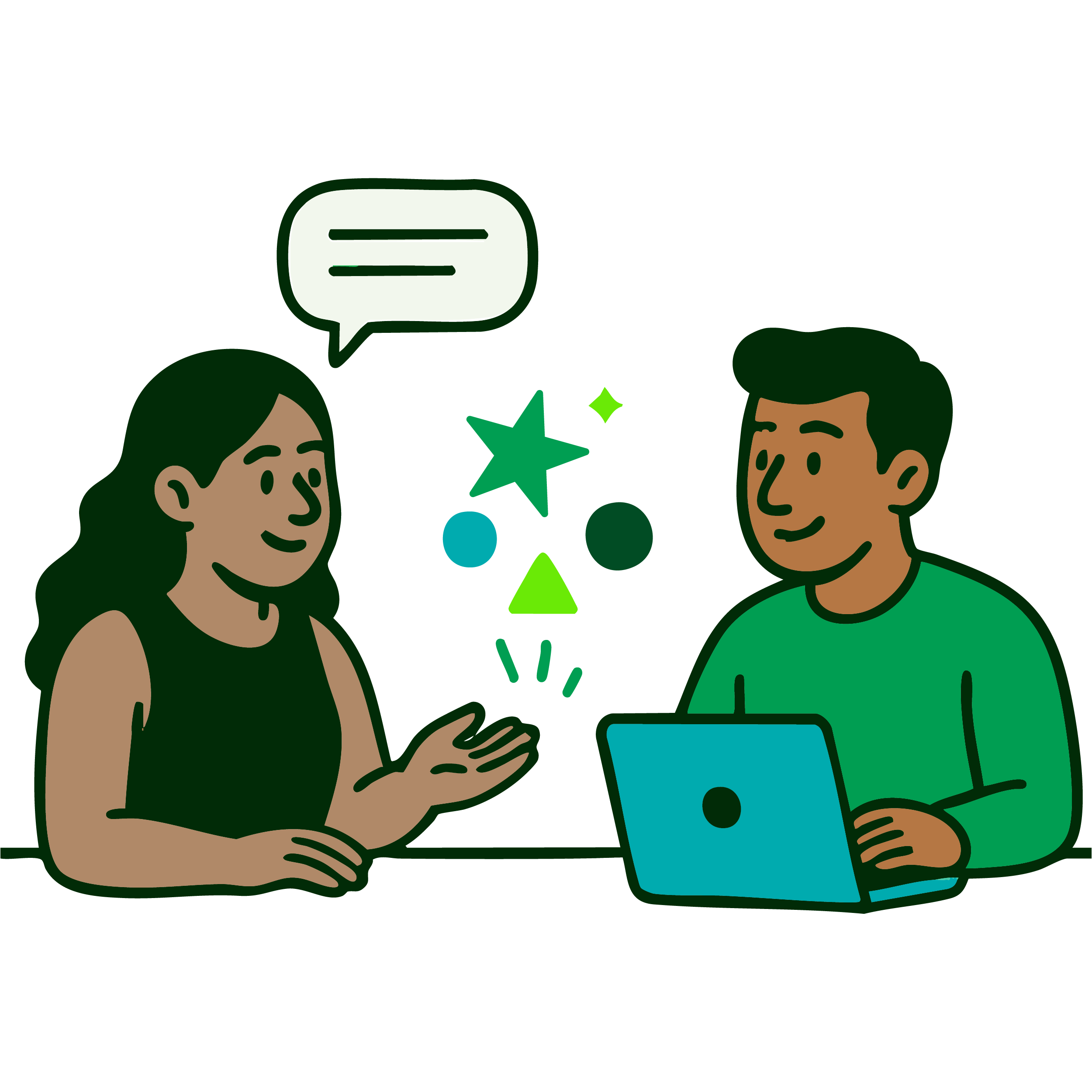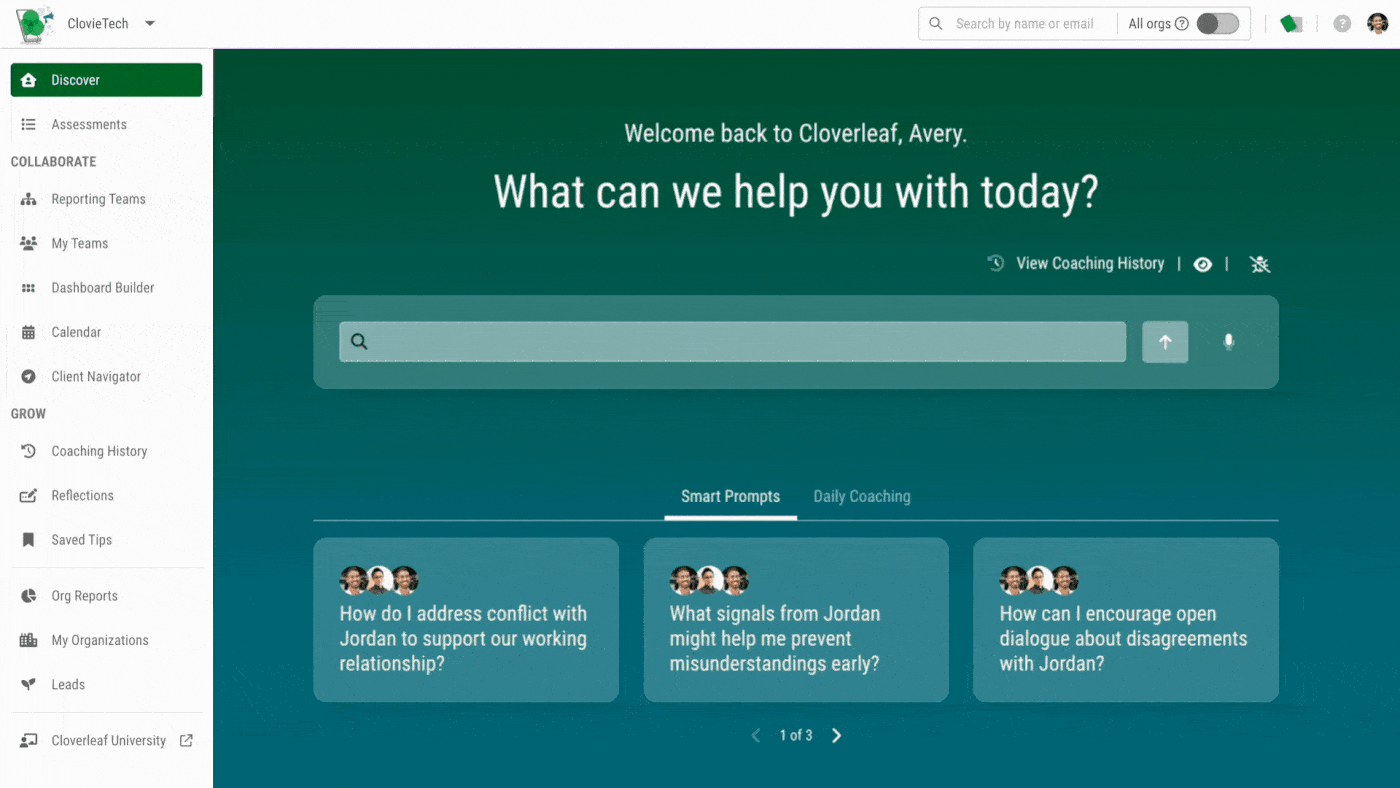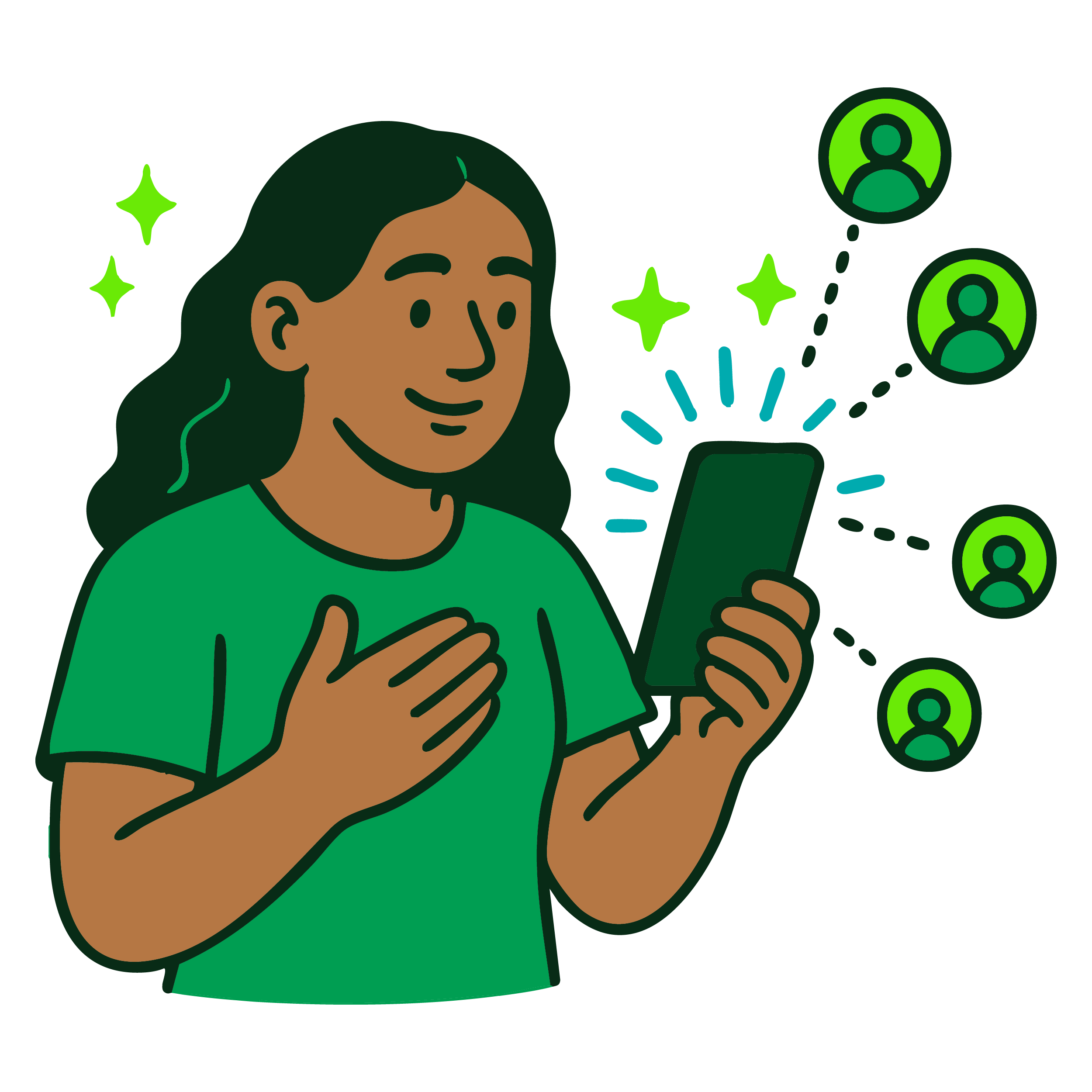AI Coaching for managers
Building confident, connected, and change-ready leaders
BROWSE TOPICS
TL;DR (for HR and Talent Development leaders)
Managers sit at the intersection of culture, performance, and change but most are underprepared and overextended.
AI coaching can give every manager access to personalized, real-time leadership support that helps them:
- Navigate feedback with empathy.
- Build trust and psychological safety.
- Strengthen communication and collaboration.
- Lead through change with confidence and connection.
Because Cloverleaf’s AI Coach integrates directly into tools like Slack, Teams, and Calendar, guidance appears inside the tools where work already happens. It gives managers help for the conversations that shape team performance: one-on-ones, feedback, meetings, and moments of tension.
It’s how talent leaders scale great leadership without adding more headcount, training programs, or complexity.
Why are managers the most important—and overlooked—audience for AI coaching?
Managers are the heartbeat of every organization. They are the link between strategy and execution, culture and behavior. They have the most direct influence on engagement, retention, and team performance — yet often receive the least ongoing support.
But they’re also one of the most overextended roles in the modern workplace. Managers today are asked to lead distributed teams, navigate constant change, handle tough conversations, and still deliver results—all without additional time, resources, or support.
So when they look for help, where do they turn?
Too often, it’s the internet. Forums like r/managers are filled with tactical, fear-based advice—“document everything,” “solve every problem,” and “don’t get too close.”
What’s missing? Guidance that’s actually human.
Instead of training managers to remember frameworks or best practices, AI coaching tools can help them know what to do and how to apply the right behaviors, right when they matter most.
It’s like having a trusted advisor on your shoulder—helping you know what to say, what to avoid, and how to strengthen every interaction.

How can AI coaching help managers lead with confidence and connection?
Confidence as a manager isn’t about having all the answers. Great managers understand and know how to approach the people around you.
Best in class AI coaching tools can help managers:
- Understand what motivates each team member.
- Adjust their communication style to fit individual needs.
- Recognize early signs of tension and address them constructively
- Build habits that strengthen trust and collaboration over time.
For example, Cloverleaf’s ai coach builds insight that is grounded in validated behavioral science—from DISC, Enneagram, and 16 Types data. It is accessible in real time or integrated with the collaboration tools teams already use so that guidance is contextual and accurate.
Contextual and personalized coaching enables leadership growth to happens in the flow of work, when managers need it the most.

How does AI make feedback less stressful and more human?
Practicing feedback should strengthen trust, not create anxiety. Yet many managers avoid it, not because they lack skill, but because they worry about how their words will land.
Most managers hesitate to give i because they don’t know how and they feel unsure how it will land.
Cloverleaf helps managers navigate those leadership moments by providing guidance that is informed by combining behavioral data, team context, and timing to deliver coaching that is most accurate and useful.
Here’s how it works:
- Before a meeting: Cloverleaf pulls data from calendar invites and team profiles to identify who a manager is meeting with, then surfaces insights about how that person prefers to receive feedback. For example, it might remind a manager that one teammate values directness, while another responds better to encouragement first.
- During the conversation: Within tools like Slack or Teams, managers get phrasing and empathy cues drawn from validated behavioral models such as DISC, Enneagram, and 16 Types. These tips help them balance clarity and compassion in real time.
- Afterward: Cloverleaf follows up with reflection prompts that reinforce what worked, what to adjust, and how to maintain psychological safety in future discussions.
Each coaching moment connects to the data Cloverleaf already understands about the team — personalities, communication styles, and collaboration patterns — so the guidance feels natural and specific, not generic.
Over time, this steady reinforcement turns feedback from a stressful, infrequent event into a normal part of everyday communication. Managers gain confidence. Teammates feel heard. Trust grows through consistent, informed interactions.

How can managers use AI coaching to lead through change and uncertainty?
Change is constant, and managers are the ones translating company shifts into daily reality. They handle uncertainty, questions, and emotion — often without enough tools or context to support the human side of that process.
Cloverleaf’s AI Coach provides relational insight during those high-stakes moments to help managers understand how each person on their team processes uncertainty, handles stress, and needs to be supported.
AI coaching can support managers tp lead through change with more clarity and empathy:
- Team awareness before change is announced: Cloverleaf analyzes team composition and personality data to show how each person might reacts to uncertainty or shifting expectations. Managers can see who needs clarity, who prefers collaboration, and who may withdraw under pressure.
- Coaching in real time: As managers prepare for reorg updates, performance conversations, or team meetings, Cloverleaf surfaces insights inside tools like Slack, Teams, and Calendar. A nudge might suggest language that reassures a stability-seeking teammate or encourages engagement from someone who tends to stay quiet during change.
- Ongoing reinforcement: After the initial rollout, Cloverleaf tracks team sentiment through interaction data and prompts managers to follow up in ways that rebuild confidence and maintain alignment. These follow-ups help keep communication open long after the first announcement fades.
Because Cloverleaf’s insights are rooted in validated behavioral assessments and the actual relationships within a team, the coaching adapts as people respond and situations evolve. Managers don’t need to guess who’s struggling or rely on one-size-fits-all playbooks — they get timely, personalized guidance that helps them lead with empathy and consistency.
The result is change that feels supported, not forced. Managers stay grounded, teams stay connected, and trust becomes the stabilizer that carries everyone through transition.

What leadership skills can AI coaching help strengthen most?
Cloverleaf’s AI Coach develops the interpersonal and adaptive skills that drive trust, performance, and retention.
Unlike static workshops, it builds these behaviors through daily, in-the-moment practice — guided by behavioral data and real team context.
1. Feedback and Communication
Cloverleaf helps managers prepare for real conversations, not hypothetical ones. Before meetings or one-on-ones, managers receive short, personalized insights about how each person prefers to give and receive feedback. This helps them adjust tone, pacing, and phrasing so messages are heard, not resisted. Over time, these micro-adjustments create a rhythm of clear, consistent communication.
2. Emotional Intelligence
Through personality assessments like DISC, Enneagram, and 16 Types, Cloverleaf helps managers recognize their own blind spots and understand what triggers or motivates their team. By surfacing these reminders in everyday tools like Slack and Calendar, it keeps emotional awareness active during real interactions — not just as a theory from training slides.
3. Trust Building
Trust develops through small, repeatable moments of reliability and empathy. Cloverleaf prompts managers with actions that reinforce dependability — following up after tough feedback, recognizing contributions, or checking in with quiet teammates. These reminders make trust-building intentional instead of accidental.
4. Adaptability
Every change initiative affects people differently. Cloverleaf helps managers see those differences and respond with flexibility. It offers suggestions on how to reframe communication for different stress responses or personality types, allowing leaders to stay calm, clear, and connected when plans shift.
5. Coaching Mindset
Cloverleaf encourages managers to move from “telling” to “asking.” It provides question frameworks and conversation cues that promote curiosity, reflection, and ownership in their teams. Managers learn to guide development through dialogue, not directives — creating teams that are more self-aware and self-sufficient.
These skills build on one another. Together, they form a leadership foundation that is measurable, repeatable, and visible in daily behavior — the kind of growth that no workshop alone can sustain.

Measuring the impact of AI coaching on manager performance
Cloverleaf’s AI Coach helps managers improve in the areas that matter most to team performance: communication, feedback, and trust. The impact shows up in daily interactions, not just surveys or annual reviews. Managers become more consistent, more confident, and more connected to their teams because they’re getting small, specific coaching moments right when they need them.
- 86% of teams report stronger performance after using Cloverleaf to prepare for feedback, meetings, and development conversations. The improvement comes from real-time coaching that helps them adapt communication to each team member’s style and motivation.
- 2× higher engagement with development tools compared to standard leadership programs. When coaching happens in Slack, Teams, and email, managers actually use it — not just once a quarter, but every week.
- Two-thirds of learnings applied in team settings, not just individual reflection. Because Cloverleaf connects to real team interactions, coaching tips naturally translate into group behaviors like collaboration, trust-building, and better meeting habits.
- Behavioral growth that can be measured. HR and talent leaders can see usage patterns, feedback quality, and trust indicators improve over time — giving visibility into leadership development that traditional programs can’t provide.
These results come from making leadership support part of daily work. AI coach’s can meet managers where they already spend their time, giving relevant coaching that helps them lead better conversations, make clearer decisions, and strengthen their teams a little more each day.

Why leadership development needs to be redesigned for the managers day to day reality
Most leadership programs still rely on a model built decades ago: teach a lot of content up front, hope it sticks, and measure success through attendance.
The problem is that real work doesn’t happen in classrooms. Managers don’t lead from slides or frameworks. They lead in the middle of meetings, project changes, and difficult conversations where there’s rarely time to review training notes.
Research shows that most employees forget more than half of what they learn within a day of training. Knowledge alone isn’t the issue. Managers fail to grow when they don’t have timely, practical support in the moments when leadership matters most—like preparing for feedback, navigating conflict, or leading teams through change.
For the first time, technology can keep pace with how people actually learn and develop. AI can personalize growth for every manager, using data about their team dynamics, communication habits, and work patterns to surface insights that help them lead more effectively.
That means HR leaders can move beyond static training cycles to create continuous, measurable growth.
It also means you can connect development data — feedback patterns, engagement signals, trust levels — directly to business outcomes like retention, collaboration, and performance.
This is the shift from event based knowledge transfer to sustainable support for behavior change, from training events to everyday coaching.
It’s the next step in leadership development more timely, more personal, and more sustainable.

